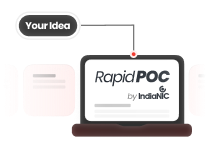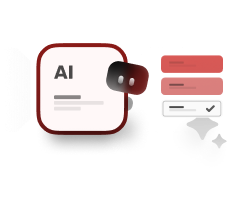Discover insights, trends and stories that drive smarter innovation.
Ready to go an extra mile to deliver great software solutions.
Get to know how can you work with us.
To discuss your idea and consult with our technology experts.
Explore current openings and apply to be a part of IndiaNIC.
Create your own agile team by forming right set of resources skilled in specific streams.
Empowering organizations with robust and scalable enterprise applications tailored to the needs
Harnessing the power of artificial intelligence to drive innovation and boost efficiency
Creating high performance and engaging digital commerce solutions to maximize the business
Seamlessly integrating technologies to build cohesive and efficient IT infrastructures
Streamlining operations and boosting productivity with custom business automation solutions
Turning data into actionable insights with our advanced BI and analytics development service
Our learning from variety of industries over more than two decades have helped us bring immediate impact.
Leverage 27 years of expertise and AI to turn your idea into a working prototype.
Sculpting modern, dynamic web applications for a digital-first world
Designing high-performing mobile apps for a connected future
Leveraging AI & ML to Deliver innovative solutions
Enhancing experience with intuitive and user-centric design services
Streamlined Processes and Collaboration for code lifecycle
Delivering excellence with robust automated and manual QA
Leveraging the device ecosystems to build a connected world
Crafting result-driven strategies to propel your business forward

A gallery of astonishing solutions delivered to the most recognized brands.

Explore how IndiaNIC delivered IT Solutions to Startups & Enterprises.

A glimpse to our expertise in design, development & industry experience.

Digital tools developed by us for businesses to be more productive.
Automate and innovate with intelligent AI solutions for modern enterprises.
-
-
- Home Ai
-
Custom AI Services
Smart AI solutions designed to automate tasks, improve strategies, and maximize impact.
-
NLP Solutions
Improve communication, streamline support, and extract insights with cutting edge NLP.
-
Computer Vision Services
Unlock intelligent automation with AI powered image recognition, video analytics, and facial recognition.
-
Generative AI Solutions
Unlock creativity and personalization with AI driven content and intelligent recommendations.
-
Data Science & Analytics
Convert raw data into strategic insights that fuel growth.
-
AI Tech Stack
We utilize cutting edge AI, ML, and deep learning technologies to drive innovation.
-
AI Agents
Enhance efficiency by automating processes, customer engagement, and decision making with AI Agents.
-
AI Operations (AI Ops)
AI driven IT operations: smarter insights, automated workflows, and predictive capabilities.
-
Machine Learning Development
Delivering custom ML models and predictive analytics to drive business success.
-
AI & Machine Learning Overview
Explore how AI and ML can transform operations and drive business growth.
-
AI-Driven Business Transformation
Redefine your business strategy, increase productivity, and explore new revenue potential with AI.
-
AI & ML Model Expertise
Utilize advanced AI and ML models supervised, unsupervised, and deep learning to tackle complex challenges.
-
- Home Services
-
Web Development
-
Mobile Apps
-
AI / ML
-
UI/UX Consultancy
-
DevOps
-
QA
-
IoT
-
Marketing
-
- Home Methodology
-
Discovery
Transforming ideas into a measurable scope with functional UI/UX Design.
-
Project Execution
Get to know how we balance the critical triangle of Cost, Time and Scope.
-
Dedicated Developers
Form an expert team who works remotely, under your supervision.
-
Project Review
Proactive review at every stage for the efficient delivery.
-
- Home Work
-
 Popular Brands
Popular BrandsA gallery of astonishing solutions delivered to the most recognized brands.
-
 Case Studies
Case StudiesExplore how IndiaNIC delivered IT Solutions to Startups & Enterprises.
-
 Our Work
Our WorkA glimpse to our expertise in design, development & industry experience.
-
 Products
ProductsDigital tools developed by us for businesses to be more productive.
Page not found
Sorry, the page you are looking for could not be found. It might have been moved, deleted, or you entered the wrong URL.
Go to Home


